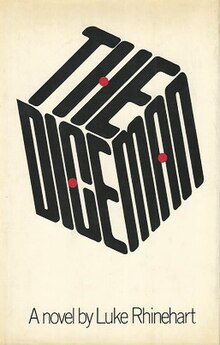The Dice Man
This article needs additional citations for verification. (August 2011) |
 First edition cover | |
| Author | Luke Rhinehart |
|---|---|
| Country | United States |
| Language | English |
| Publisher | William Morrow |
Publication date | 1971 |
| Media type | Print (hardback & paperback) |
| Pages | 500 pp. (paperback edition) |
| ISBN | 0-00-716121-2 (2003 paperback edition) |
| OCLC | 59367330 |
| Followed by | The Search for the Dice Man |
The Dice Man is a novel published in 1971 by George Cockcroft under the pen name Luke Rhinehart and tells the story of a psychiatrist who begins making life decisions based on the casting of dice. Cockcroft wrote the book based on his own experiences of using dice to make decisions while studying psychology.[1] The novel is noted for its subversivity, anti-psychiatry sentiments and for reflecting moods of the early 1970s. Due to its subversive nature and chapters concerned with controversial issues such as rape, murder and sexual experimentation, it was banned in several countries.[2] Upon its initial publication, the cover bore the confident subheader, "Few novels can change your life. This one will" and quickly became a modern cult classic.[3][4] The book went through a number of republishings - in the United States it acquired the even more confident subheader "This book will change your life", in spite of its being a highly edited version of the original.[verification needed] It was initially less successful than in the United Kingdom and Scandinavia.[citation needed]
The themes of the book are continued in two other novels, The Search for the Dice Man and Adventures of Wim and a companion title, The Book of the Die.
Plot summary
The book tells the story of a psychiatrist named Luke Rhinehart who, feeling bored and unfulfilled in life, starts making decisions about what to do based on a roll of a die. Along the way, there is sex, rape, murder, "dice parties", breakouts by psychiatric patients, and various corporate and governmental machines being put into a spin. There is also a description of the cult that starts to develop around the man, and the psychological research he initiates, such as the "Fuck without Fear for Fun and Profit" program.
References in popular culture
- The song "The Diceman" by Swedish band Vogon Poetry is inspired by the novel.
- Two plays have been produced based on the ideas in The Dice Man: The Dice House, written by Paul Lucas and produced by Neal Foster's Birmingham Theatre Company, and The Six Sided Man by Gavin Robertson.
- The script for Dice, a Canada/UK co-produced TV mini-series directed by Rachel Talalay in 2001, was inspired by The Dice Man.
- The song "Dice Man" by Mancunian band The Fall is inspired by the novel.
- The song "Such a Shame" by Talk Talk was inspired by The Dice Man,[5] one of songwriter Mark Hollis' favourite books.
- The melodic death metal band At the Gates has quotations from the book in the songs "Blinded by Fear", "Slaughter of the Soul" and "World of Lies" from the Slaughter of the Soul album; the lyricist/vocalist Tomas Lindberg has cited it as a major lyrical inspiration.
- In an episode of the popular British soap opera Emmerdale, characters Cain Dingle and Jasmine Thomas discuss the novel and its direct themes.
- In episode #1.3 of TV mini-series The Game, book is read by two characters on train.
Publishing history
- ISBN 0-900735-00-7 - September 9, 1971
- ISBN 0-246-11058-9 - July, 1978
- ISBN 0-586-03765-9 - April 13, 1989
- ISBN 0-87951-864-2 - July, 1998
- ISBN 0-00-651390-5 - December 15, 1999
- ISBN 0-00-716121-2 - April 7, 2003
References
- ^ Author interview, The Guardian, 27 August 2000 accessed 13-04-09
- ^ Luke Rhinehart - Author
- ^ Trott, Barry, and Kelly Fann. "Tapping Into The Appeal Of Cult Fiction." Reference & User Services Quarterly 51.1 (2011): 15-18. Academic Search Premier. Web. 7 Mar. 2013.
- ^ Dickson, E.Jane. "Striptease at the roll of the dice." Times, The (United Kingdom) 04 Nov. 2000: Newspaper Source Plus. Web. 7 Mar. 2013.
- ^ Neiss, James (December 1991). "Talk Talk". Record Collector. No. 148. Diamond Publishing Group Ltd. pp. 18–23.
